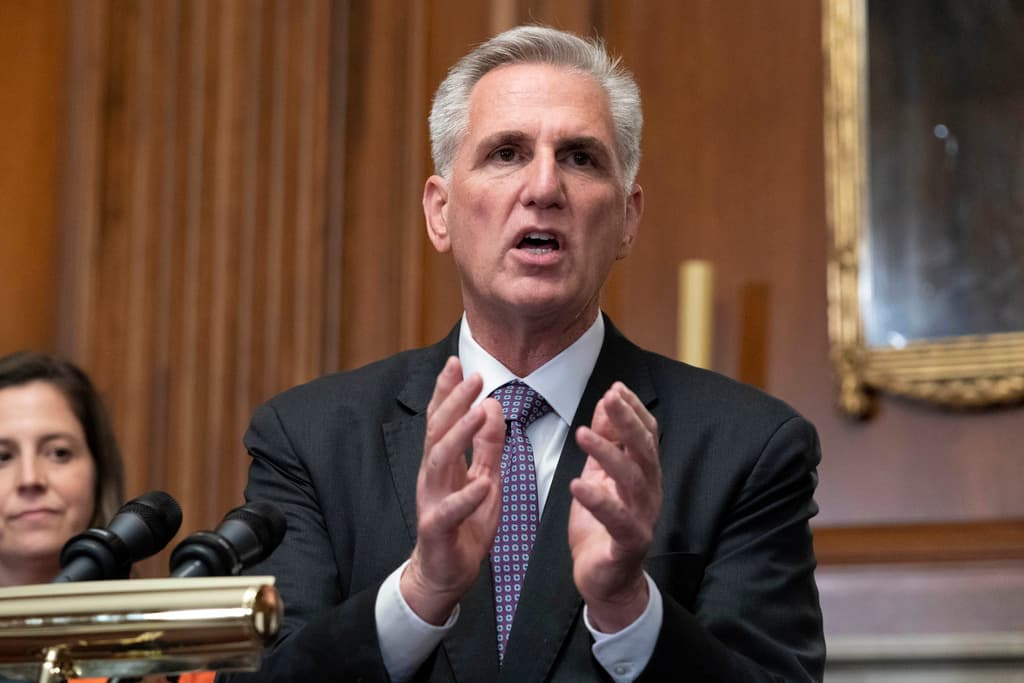Frustrations Over Failure To Pass Censure of Adam Schiff Spill Over as McCarthy Loses Control of His Conference
In his quest for the gavel, McCarthy made a number of concessions related to the House’s rules and procedures that could end up being his downfall.

With the budget process beginning in the House this month, Speaker McCarthy hopes to keep his members in line, but a failure to censure Congressman Adam Schiff has exposed ugly fault lines in the GOP caucus and Mr. McCarthy’s inability to satisfy all sides.
On Wednesday, Mr. McCarthy’s most ardent detractors had hoped to punish President Trump’s chief congressional instigator, Mr. Schiff, who is loathed by the right. A censure vote against the former Intelligence Committee chairman would have fined him millions of dollars, but moderates in the GOP conference revolted, pushing the more conservative members aside.
The censure resolution, introduced by Congresswoman Anna Paulina Luna, failed by a vote of 225-196, with 20 Republicans lining up against the measure. Those included members of Mr. McCarthy’s leadership team who reportedly told their colleagues to vote against the resolution, according to Punchbowl News.
On Wednesday, the House also considered an amendment to a bill that would have forced all federal abortion regulations to be approved by Congress, not just unilaterally implemented by executive agencies. When the measure failed with the help of 10 GOP moderates from districts that President Biden won, conservatives in the House lashed out against their colleagues. “It says a lot about where we are today when 10 Republicans cannot bring themselves to vote for Life,” Congressman Bob Good wrote on Twitter.
Mr. McCarthy’s tenuous hold on his job was first put on display June 6, when conservatives banded together to kill a rule that would have allowed the House to debate legislation that would have protected gas stoves from federal regulation.
The gas stove protection legislation seemed like a simple issue that would satisfy every member of the Republican conference from Congresswoman Marjorie Taylor Greene to Biden district moderates. But 12 conservative members of the House Freedom Caucus stopped the legislation in its tracks as retaliation for the debt ceiling bill that Republican leadership crafted with the White House.
“We took down the rule because we’re frustrated at the way this place is operating,” Congressman Matt Gaetz told reporters after he and his compatriots killed the gas stove rule. “We took a stand in January to end the era of the imperial speakership. We’re concerned that the fundamental commitments that allowed Kevin McCarthy to assume the speakership have been violated as a consequence of the debt limit deal.”
The gas stove legislation eventually passed through the House, but tensions remain between Mr. McCarthy and the Freedom Caucus. A messaging bill as simple as the gas stove legislation should have sailed through the House with no GOP dissent, but the acrimony could bode poorly for the speaker as budget negotiations begin in earnest.
After the gas stove legislation failed, the speaker seemed to throw one member of his leadership team under the bus — the majority leader, Congressman Steve Scalise. “We put different roles out there and the majority leader runs the floor,” Mr. McCarthy said of Mr. Scalise. “It was a conversation that the majority leader had with Clyde and I think it was a miscalculation — or misinterpretation of what one said to another,” Mr. McCarthy said of Congressman Andrew Clyde, a conservative member who helped lead the revolt against the gas stove rule.
The conservatives who revolted show no sign of relenting as they continue to gripe to the press about how Mr. McCarthy reneged on the deal he had made with the Freedom Caucus before his speakership began in January. “This is what we fought for in January,” Congresswoman Lauren Boebert said of creating a more open process in the House. “We were serious when we did it. We said Congress is broken, and we want fundamental changes to this place.”
In his quest for the gavel, Mr. McCarthy made a number of concessions related to the House’s rules and procedures that could end up being his downfall, including lowering the threshold for calling for a vote of no confidence in the speaker to just one member. With more than 10 active dissenters in his conference, any one of them could pull the ripcord at a moment’s notice and plunge the House into chaos.
In 2015, Speaker Boehner resigned from Congress after a no confidence vote — known as a motion to vacate — was introduced and gained traction among his conservative colleagues. Under Mr. Boehner, the motion to vacate required the support of 29 members. At the time of his resignation, the resolution had 25 signatories, most of whom came from the Freedom Caucus.
After the debt ceiling deal was negotiated, conservative members began raising the prospect of ousting Mr. McCarthy. “I think he should be concerned,” a Freedom Caucus member, Congressman Ken Buck, said. “We will have discussions about whether there should be a motion to vacate or not,” he told CNN just hours before the House voted on the debt ceiling legislation.

